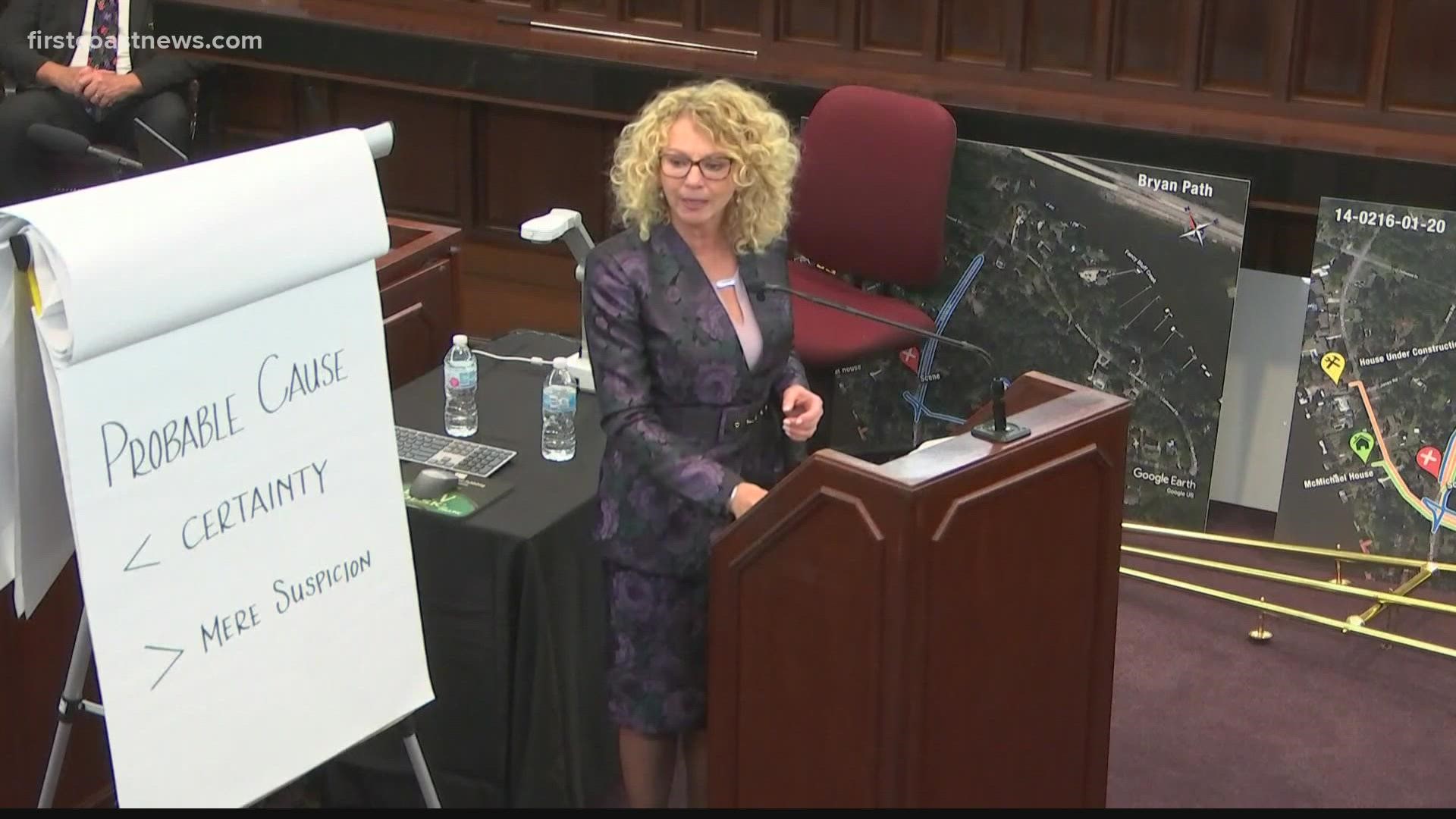JACKSONVILLE, Fla. — Three words that caused the mother of Ahmaud Arbery to gasp and bolt from the courtroom, uttering, “I gotta get out of here.”
Three words that prompted denunciations from celebrities ranging from Whoopi Goldberg to Beyonce’s mom.
Three words that seemed to reanimate the racist frame of a criminal case that attorneys for Greg and Travis McMichael worked hard to dispel.
“Long, dirty toenails.”
Laura Hogue spoke those words in her closing argument on behalf of the elder McMichael, who along with his son and neighbor Roddie Bryan chased 25-year-old Arbery through their Satilla Shores neighborhood in February 2020, before Travis McMichael shot and killed him.
In her first in-depth interview on those comments, Hogue defended her choice to say what she did.
“I’m proud of what we did,” she told First Coast News. “I stand behind every defense move we made unless there was a way we could’ve had more impact [on the jury’s verdict].”
Despite the outrage the comment sparked, Hogue said, “the only compunction I have ever had as a defense attorney is knowing the pain it brings to the family of the deceased.”
Her comments did cause pain; Hogue acknowledges hearing Cooper Jones react. “I heard her exhale and leave the courtroom for a while,” she said. And that’s hard to do, but I have a duty, and I have to fulfill that duty without fear or favor.”
As to why she chose the words she did, Hogue said it was to contradict the state’s theory that Arbery was jogging, and bolster her client’s assertion that he was fleeing from a burglary.
“To undo the ‘jogger’ narrative, I had to have the fortitude to say it front and center: These are not the feet of a runner, this is not the conduct of a runner, this is not the behavior of a runner.”
The condition of Arbery’s feet, noted during the testimony of the medical examiner who conducted his autopsy, carried larger significance, Hogue said. “We had pieces of Travis’ testimony and Ahmaud’s own behavior that suggested deteriorating mental health. Anyone knows that deteriorating hygiene is symptom number one.”
When asked why she might have made that connection more clear, she said, “I don’t leave an image and tell you what you should feel about it. I leave an image – ‘plant an acorn,’ as they say -- and jurors pull from it what they pull from it. I need them to be able to say ‘long, dirty toenails’ when they are deliberating. If I didn’t have the gumption to say it, they wouldn’t have the gumption to say it.”
The firestorm over her comments has diminished but not disappeared. This week, it precipitated her departure from an institution she once helped run. In a letter obtained by First Coast News, Hogue resigned her position with the National Criminal Defense College.
“Given the direction the college is now heading, it is no longer compatible with my commitment to educating the next generation of supportive, creative, zealous, client-centered Sixth Amendment defenders of people accused of crimes,” she wrote.
An attorney affiliated with the school said off the record that Hogue’s comments were controversial and divisive within the college community. “There was a lot of turmoil a back and forth. The faculty split into factions, some believing that what she and her defense team did was very wrong, and others who were saying she was just representing the best traditions of zealously advocating for the client.”
Hogue says the college issued a statement that “joined with much of the knee-jerk reaction to the case and … goes against my beliefs in what we should be doing in training criminal defense attorneys.”
“That organization, just like any criminal defense organization, should be there to help explain to the public what we do,” she continued. “But instead, they chose to see it the way the public did, even though they are more informed about what we do and why we do it.”
Hogue says the school’s position on the Arbery case reflects a mission that doesn’t align with her beliefs in the work of criminal defense attorneys.
“The college’s mission statement now -- their evolving mission of wiping out racism in all forms in the justice system – is a noble and important cause. But it is going to butt heads, is going to conflict with the professional obligation of a professional defense attorney.”
“Fidelity to client is the only and paramount interest,” she continued, adding, “I have never been in a situation where I have to remind my colleagues what we do for a living and that we should stand with, watch over and support each other.”
“I split with the college because I don’t see a place for describing my arguments of self-defense, which necessarily attempted to devictimize Ahmaud Arbery -- not dehumanize, but devictimize. Which is what every defense attorney has to do. I can’t put the deceased on a pedestal and say, ‘but we had no choice but to kill him.’ When you’re in the position, as the facts laid themselves out, of defending yourself, you necessarily are defending yourself from someone attempting to do you serious bodily harm."
Despite the blowback that her comments created, Hogue believes the work the defense team did overall disrupted the dominant narrative that emerged after the release of cell phone video of the killing.
“I think it’s put to rest the notion that Greg and Travis woke up that day and saw a Black man jogging in their white neighborhood and decided to hunt him down and lynch him.”
Hogue believes observers and jurors left the case knowing “the story we’ve been hearing is not the truth of the case.” And getting to that truth, Hogue said, meant “we are going to have to say some tough things about a young man who lost his life.”

